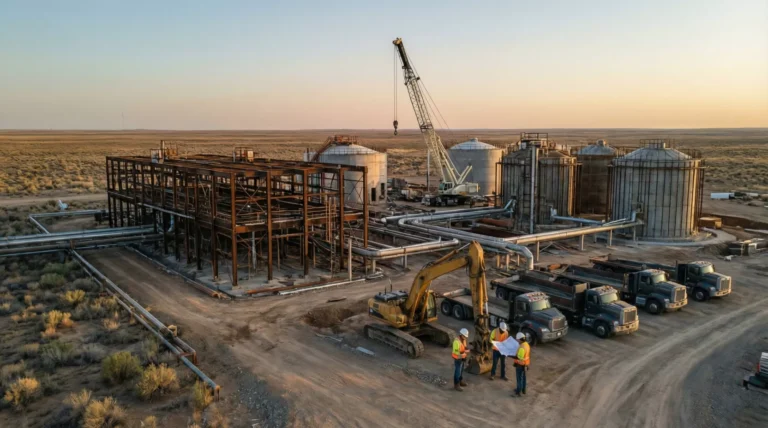
Avangrid Advances U.S. Clean Energy Goals with 200,000 Solar Modules from SEG’s New Texas Facility
Avangrid, Inc., a prominent sustainable energy company and part of the global Iberdrola Group, has announced the successful production and assembly of more than 200,000 solar modules by SEG Solar at its newly launched facility in Houston, Texas. These American-made solar modules will be a cornerstone of Avangrid’s 166 megawatt direct current (MWdc) Tower Solar project, currently under construction in Morrow County, Oregon. The project is expected to provide clean electricity to Portland General Electric’s (PGE) power grid and support Meta’s energy-intensive data center operations in the Pacific Northwest.
This milestone marks Avangrid as the first utility-scale customer to receive solar modules from SEG Solar’s new U.S. manufacturing facility—an important step toward expanding the domestic clean energy supply chain. It also reinforces the growing commitment of both companies to investing in American manufacturing and infrastructure.
Building Domestic Manufacturing Capabilities
SEG Solar’s Houston-based plant, which officially began production in mid-2025, represents a $60 million investment in U.S. renewable energy infrastructure. The 250,000-square-foot facility is designed to produce up to 2 gigawatts (GW) of solar modules annually and currently employs over 300 workers. That number is expected to grow to more than 500 when the plant reaches full operational capacity. The facility manufactures high-efficiency solar products including SEG’s Yukon N Series modules, rated at 630 watts-peak (Wp), which are known for their durability and performance.
By choosing SEG Solar as a key supplier, Avangrid is helping to fortify domestic solar manufacturing, which has become a critical focus for the U.S. energy sector amid efforts to reduce reliance on foreign-sourced materials and to improve supply chain resilience. This partnership not only supports clean energy development but also boosts local economies—particularly in Texas, where the SEG facility is located, and in Oregon, where the Tower Solar project is being built.
Strategic Alignment and Shared Vision
“Domestic partnerships are critical to meeting rising demand, and by leveraging U.S. manufacturing, Avangrid has an opportunity to support local jobs and economic opportunity in states like Texas, while advancing a reliable energy future powered by American-made products,” said Jose Antonio Miranda, CEO of Avangrid. “Our work with SEG Solar demonstrates not only our commitment to building out the domestic supply chain, but also the benefits of investing in American energy infrastructure. We are proud to see our Tower Solar project move forward with the delivery of these modules.”
This collaboration is not the first between Avangrid and SEG Solar. According to Logan Fang, SEG’s Vice President of Key Accounts, this 166 MW project is the third successful engagement between the two companies. “We are thrilled to have been selected as the module supplier for Tower Solar in Morrow County, Oregon,” Fang said. “This project marks another chapter in our ongoing partnership, and we’re excited to see our premium Yukon N Series modules contributing to the growth of renewable energy in the Pacific Northwest.”

Supporting Green Power Through Tower Solar
The Tower Solar project is a major component of Avangrid’s renewable energy portfolio and reflects its long-term commitment to decarbonization and utility-scale solar development. With a projected capacity of 166 MWdc (120 MWac), Tower Solar is expected to be operational in 2026 and will significantly contribute to PGE’s renewable energy offerings through the Green Future Impact (GFI) program.
GFI is a voluntary renewable energy program developed by Portland General Electric to provide commercial, industrial, and municipal customers with direct access to new clean energy resources. Customers enrolled in GFI receive bundled Renewable Energy Certificates (RECs), ensuring that their energy consumption is matched by renewable generation from dedicated projects like Tower Solar. Importantly, the program’s pricing structure is designed to prevent cost shifting to PGE customers who do not participate in GFI.
Meta, the parent company of Facebook and other platforms, is one of the key GFI subscribers and will benefit from the renewable electricity generated by Tower Solar. This partnership illustrates how large-scale clean energy projects can be tailored to help companies meet ambitious environmental, social, and governance (ESG) targets while supporting utility goals.
Local Economic and Community Impact
Beyond clean energy, Tower Solar promises substantial economic benefits for Oregon. The construction phase is projected to create over 200 jobs, with the majority being sourced locally. These jobs will include roles in construction, logistics, maintenance, and support services, providing a short-term employment boost to the region and fostering workforce development in the renewable energy sector.
In addition to job creation, the project is expected to deliver approximately $20 million in total revenue through a combination of payment in lieu of taxes (PILOT) and traditional property taxes over the life of the facility. These funds will support a range of local public services, with particular benefit to schools and educational institutions in Morrow County.
As renewable energy facilities like Tower Solar become more common, they are increasingly seen not only as environmental assets but also as economic engines for rural and semi-rural communities. With tax contributions supporting local infrastructure, and job creation spurring regional growth, the holistic benefits of such projects are difficult to ignore.
Commitment to a Clean Energy Future
For Avangrid, Tower Solar is just one of many projects in a rapidly growing clean energy portfolio that spans wind, solar, and green hydrogen. The company is positioning itself as a key player in America’s transition to a low-carbon economy, and partnerships like the one with SEG Solar illustrate how integrated supply chains and strategic investments can accelerate the pace of renewable deployment.
The collaboration also exemplifies how policy-driven incentives and private-sector ambition can intersect effectively. By investing in domestic manufacturing and channeling those products into utility-scale projects with clear commercial offtakes, Avangrid and SEG Solar are not only helping the U.S. reach its climate goals, but also proving that clean energy can deliver tangible benefits across multiple sectors.










